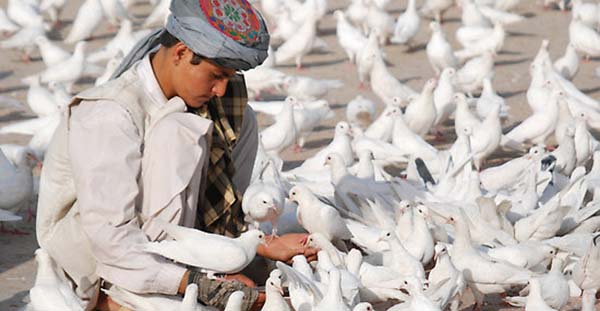During his thirteen years of ruling Afghanistan, former president Hamid Karzai spared no efforts to bring Taliban leaders to table of peace negotiations. But he failed in reaching out to the Taliban and convincing Pakistan to help the Afghan government in its efforts for peace. The reasons behind the long-lasting Kabul peace efforts are many. But the most crucial factor that failed Hamid Karzai’s government in its peace efforts was its inability to seek a solution through regional integrity that includes major players such as Pakistan, China, Saudi Arabia as well as the United States. President Karzai’s lacked a cohesive strategic approach towards the talks with the Taliban as well as relations with Pakistan.
Since coming to power, the National Unity Government (NUG) quickly moved to prepare the ground in order to kick-start the peace process. President Ashraf Ghani made the talks with the Taliban his top priority. Along with rebalancing of Afghanistan’s foreign policy aimed at benefiting peace efforts, the government of Afghanistan also sought national consensus over the new government’s approach towards Pakistan and negotiations with the Taliban. With the unity government determined in starting a fresh round of efforts for peace, there were widespread skepticisms to Kabul sudden shift of foreign policy towards Islamabad. The government of Afghanistan quickly moved to assure Afghan political elite that the efforts are heading into the right direction.
Since the National Unity Government (NUG) is formed in Kabul, Afghanistan has drastically changed its attitudes towards Pakistan, who is believed to have the ultimate influence over the Afghan Taliban. Unlike Hamid Karzai, who used to openly criticize Pakistan, the leaders of the unity government have sought much more friendly relations with Islamabad. Since last year, the relations between Afghanistan and Pakistan quickly improved and Afghan officials have made several high-profile trips to Pakistan. As result of the thaw in relations between Kabul and Islamabad, Pakistan’s powerful military suggested its full backing to the Afghan-led peace efforts. As result of the new approach in Kabul, Afghanistan has been able to improve relations with Pakistan and securing its backing and cooperation in persuading the Taliban to come to peace negotiations with the government of Afghanistan.
With the new Afghan-led peace efforts getting momentum, all major players now seem to be on the same page in helping Afghanistan to resume negotiations with the Taliban. As a milestone for Afghanistan’s peace-oriented foreign policy, China announced its willingness to help in restarting talks with Taliban. China’s role is viewed crucially important in this regard as it has close relations with Pakistan and is one of the major donor countries to Pakistan. Building up on the rebalancing of foreign policy, the unity government leaders made a high-profile visit to Washington this month, seeking the United States long-term commitment and support for Afghanistan’s security and the efforts for peace negotiations with the Taliban. In the very initial days of coming to power, President Ghani moved quickly to repair the damaged relations of Afghanistan and the United States by signing the security agreement. These efforts aligned the dominant foreign players to back Afghan peace negotiations with the Taliban.
The history of Afghan government’s peace efforts have many lessons for the new government to learn from. Without a regional approach and a peace-oriented foreign policy, the talks go nowhere. Former president Hamid Karzai never could take a shared approach towards peace negotiations with major players such as the United States and Pakistan. The government of Afghanistan and the United States each foiled each other’s attempts to embark on negotiations with the Taliban. This was while Pakistan felt it had been given to sufficient role by both the US and the government of Afghanistan in the efforts to bring the Taliban leaders to table of peace negotiations. As result of a cohesive and shared approach, which resulted from Afghanistan’s diplomacy, the fledgling negotiations between the US and the representatives in Qatar collapsed after President Karzai severely criticized foreign countries, particularly the US, of advancing their own secret agenda in the Qatar initiative.
As the new chapter of the a decade and half war in Afghanistan started and the bulk of US-led NATO alliance withdrawn, conditions have changed not only for the government of Afghanistan but also for the Taliban and its allied groups. The Taliban have been suffering from internal rifts and the field commanders of the groups have been increasingly being alienated with the core leadership of the militant group, the Quetta Shura. As result, many of the Taliban members seem exhausted with the prolonged war and many others shifting alliance to the newly emerging Islamic State, or the Daesh. Due to this chaotic situation for the Taliban war campaign, the Taliban leadership view the group highly vulnerable with the event the IS group and the prolonged war with the Afghan government. This has brought the Taliban leadership, at least the more moderate members, to seriously ponder over the course and the outlook of the group’s militant campaign.
The new challenges on the ground as well as the new US-led Resolute Support mission to support Afghanistan security forces have led the Taliban to think that they may not be able to win the war militarily. The recent moves seen from the Taliban may be interpreted in this context. A Taliban delegation made a trip to China this year which meant Taliban reaching out to regional players who is going to play a key role in negotiations between the government of Afghanistan and the Taliban. And recently the Taliban released a biographic essay of its leader Mullah Mohammad Omar. The move was interpreted as Taliban effort to consolidate power by its leadership before any kind of peace talks with the government of Afghanistan.
In conclusion, the time has come for peace talks with the Taliban. And the government of Afghanistan is facing a key test whether or not it will be able to end the war through a peace deal with the militant groups.

